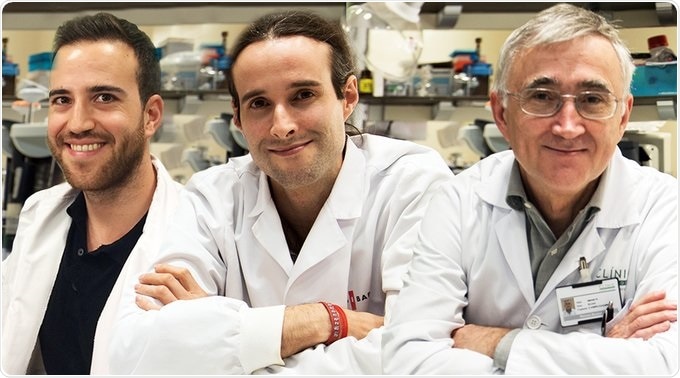A team of researchers from IDIBAPS-Hospital Clínic and the University of Barcelona has headed an international study to design an epigenetic clock that can track the number of cancer cells that have multiplied previously.

From left to right: Martí Duran-Ferrer, Iñaki Martín-Subero and Elias Campo. Image Credit: IDIBAPS.
And because of this clock, the researchers can estimate the future development of cancer cells and the clinical evolution of patients, so that new treatment strategies can be defined based on the biological risk of the tumor.
Recently published in the Nature Cancer journal, the study was supervised by Iñaki Martín-Subero, an ICREA research professor at IDIBAPS and also a lecturer from the Department of Basic Clinical Practice at the University of Barcelona. The study counted on the involvement of 32 scientists from 6 different nations and 16 institutions.
Scientific studies have recently shown that epigenetics is not only the science that explores activated or silenced genes but it also plays a role in cell memory.
We could say that the genome, which is the encyclopaedia of the current life in each cell, is formed by two types of books: the open one, with active genes, and the closed one, with genes that are silenced.”
Iñaki Martín-Subero, ICREA Research Professor, IDIBAPS
The team observed that the epigenetic modifications that occur in the closed book of the genome preserve a hidden memory of the previous cell growth.
Within the context of the published study reported in the Nature Cancer journal, the scientists investigated the epigenetic changes in over 2,000 patients suffering from different types of lymphomas and leukemia and observed that every time the cells reproduce, these epigenetic alterations write minute marks in the closed book of the genome.
According to Martí Duran-Ferrer, the first signatory of the study, since epigenetic alterations associated with cell growth are accumulative, they could create “an epigenetic clock that reflects how cells multiplied in the past.”
We observed that, if this clock advances in the past, it will do so in the future, and this is directly associated with the presence of certain genetic mutations and the clinical aggressiveness of the patients.”
Martí Duran-Ferrer, First Signatory of Study, IDIBAPS
So far, the epigenetic alterations in the closed book of the genome were considered as silent cohorts of the tumor transformation process without clinical involvements.
However, Martin observed that this research work revealed that “the accumulated epigenetic changes in the genome of the tumors are important since they predict the future clinical behavior of the patients. Cancer cells write a great part of their history in this closed book.”
The team, however, warned that more studies need to be done before the epigenetic clock reaches the clinics. But the strength of the information implies that the molecular clock may help define therapeutic strategies that better suit the biological risk of tumors.
This study shows a new view on how to anticipate the clinical behaviour of the patients with lymphoid cancer and it has a great potential to become an important variable for the clinical management of cancer in the age of customized medicine.”
Elías Campo, Director of Research, Hospital Clínic and IDIBAPS
Campo is also the professor of Pathological Anatomy at the University of Barcelona and the study’s co-author.
Source:
Journal reference:
Duran-Ferrer, M., et al. (2020) The proliferative history shapes the DNA methylome of B-cell tumors and predicts clinical outcome. Nature Cancer. doi.org/10.1038/s43018-020-00131-2.